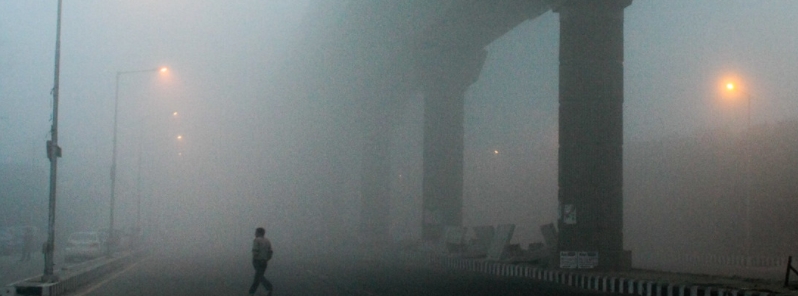Very poor air quality reported in Mumbai as severe cold wave grips North India

Cold conditions have intensified in parts of North India beginning Friday, December 18, 2020, resulting in poor to very poor air quality in Mumbai, while Delhi registered its lowest minimum temperature of the season. The cold wave is forecast to continue until Monday, December 21, according to the India Meteorological Department (IMD).
The cold conditions started intensifying on Friday, producing a dense fog that engulfed many states in the region. On the same day, Delhi recorded its lowest minimum temperature of the season so far, as the mercury dipped to 4 °C (39.2 °F).
On Saturday, Chandigarh, Amritsar, Karnal, and national capital Delhi were colder than Shimla, as well as other areas in the plains of the region such as Ludhiana, Patiala, and Hisar
Chandigarh registered 4.3 °C (39.7 °F), while Shimla had a low of 4.4 °C (39.9 °F). Temperatures in Amritsar, Ludhiana, Karnal, and Hisar pummeled to 0.6 °C (33 °F), 2.8 °C (37 °F), 2.3 °C (36.1 °F), and 2.8 °C (37.4 °F), respectively.
Manmohan Singh, director of Shimla's Meteorological Office, said the Himachal capital is having colder night temperatures than that of the plains. "This is a normal phenomenon and occurs mainly due to settling of inversion layer on mountain tops."
Cold wave grips North India, Mount Abu freezes at minus 1 degree Celsius pic.twitter.com/stn334o1rW
— India Ahead News (@IndiaAheadNews) December 19, 2020
#WeatherUpdate | Cold wave to severe cold wave conditions have been forecast in some pockets over Northern and Central India. Dense fog is likely in isolated pockets over Uttar Pradesh, Assam, Meghalaya, Nagaland, Manipur, Mizoram and Tripura.
Read: https://t.co/3L2geXZWty pic.twitter.com/CQsX42SoBA
— The Weather Channel India (@weatherindia) December 19, 2020
The severe cold wave conditions are due to widespread snowfall in hilly regions of J&K & Himachal. The icy cold winds blowing from the mountains is sweeping through the plains of North India, thus bringing the mercury down significantly.
Srinagar -6.4 & Drass -26-5, the coldest. pic.twitter.com/JV6pzTGA7H— Eagle Eye (@SortedEagle) December 18, 2020
In Mumbai, many parts of the city reported poor to very poor quality of air due to the ongoing cold wave in the north. Bandra Kurla Complex had the poorest air quality with an Air Quality Index of 362, followed by Navi Mumbai with 329– both in the very poor category.
"The poor air quality is primarily because of the cold wave which is likely to continue for at least two-three days," explained a spokesperson from the System of Air Quality Weather Forecasting and Research.
"At the same time, now the airflow has changed and more wind is coming in from the land, rather than the sea. The air quality from the land is poorer."
The IMD said cold conditions will continue to prevail over the north until Monday, with temperatures likely to increase by a few notches.



Featured image credit: Flickr

Commenting rules and guidelines
We value the thoughts and opinions of our readers and welcome healthy discussions on our website. In order to maintain a respectful and positive community, we ask that all commenters follow these rules:
We reserve the right to remove any comments that violate these rules. By commenting on our website, you agree to abide by these guidelines. Thank you for helping to create a positive and welcoming environment for all.